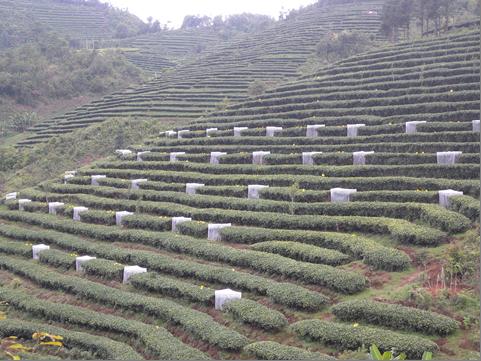|
|
|
| Actively hunting spiders more effective on leafhopper suppression in organic tea plantations |
 |
Text Size: A A A |
|
The false-eye leafhopper, Empoasca vitis (Homoptera: Cicadellidae), is a major insect pest affecting tea production throughout China.Organic farming aims to promote and enhance biodiversity while maintaining an adequate level of agricultural productivity. Spiders have been regarded as generalist predators and biological-control agents. However, spiders have variable effects on prey depending on their foraging strategies. How leafhopper populations are affected by spider abundance and diversity, representing different foraging strategies, remains unclear. Together with his teachers of Xishuangbanna Tropical Botanical Garden (XTBG), Dr. LIU Shengjie designed a study in organic tea plantations in Pu’er city, a major tea producing region in China and where tea plantations have important roles in regional socio-economics. The researchers selected three organic tea plantations at different altitudes to analyze spiders and the tea green leafhopper, E. vitis. They investigated relationships between assemblages of spiders with two foraging strategies and abundance of tea green leafhopper, E. vitis, in organic tea plantations. They then asked how spider abundance and diversity affected populations of tea green leafhopper, E. vitis and whether different spider-foraging strategies, actively hunting and sit-and-wait spiders, had different effects. The study found that the abundance and diversity of actively hunting spiders were negatively correlated with the tea green leafhopper populations, but those of wit-and-wait spiders were not. Actively hunting spiders were more effective on E. vitis suppression with potential cascading effects on tea quality and yield than were sit-and-wait spiders.  Organic tea plantationsKey WordsActively hunting spider, sit-and-wait spider, species diversity, biological control, organic tea plantation, Empoasca vitis (Homoptera: Cicadellidae) ContactProf. Yang Xiaodong Principal InvestigatorKey Laboratory of Tropical Forest Ecology, Xishuangbanna Tropical Botanical Garden, Chinese Academy of Sciences, Mengla, Yunnan 666303, China Tel: 86 691 8713236E-mail: yangxd@xtbg.ac.cn |
|

